If this week’s events are anything to go by, there is no doubting that Britain’s immigration debate remains as toxic as ever: a cesspit of racial identity politics, particularly when it comes to ethnic minority politicians deeemd to have the ‘wrong’ views on border security.
In the firing line is home secretary Suella Braverman, who supports the controversial UK-Rwanda migration partnership and gets the same abuse as her predecessor Priti Patel, another Briton whose parents came here from East Africa.
Now, Braverman could certainly have expected some criticism for saying it was her ‘dream’ to see deportation flights taking off to Rwanda before Christmas. While I don’t share the Home Secretary’s full-throated enthusiasm for packing people off to central Africa, I’m broadly supportive of the policy, largely because of the degree of domestic obstructionism to any form of meaningful asylum reform. I can also recognise, however, that it raises a number of serious moral, legal and practical questions.
But for some on the liberal left, disagreeing with the policy on its own terms isn’t enough. They feel compelled to bring in the fact that Braverman herself is of migrant stock. For instance, journalist and self-proclaimed ‘professional irritant’ Otto English tweeted that Braverman’s ‘father came to the UK from Kenya seeking refuge, after being forced out in the 1960s’, whereas ‘his daughter wants to deport modern refugees to Rwanda’.
Another full-time irritant, LBC’s James O’Brien, went even further, declaring that the ‘children of immigrants who despise other immigrants probably shouldn’t be in charge of immigration policy…They often seem to be dealing with personal issues that shouldn’t be anywhere near the political space. People who protected and defended their parents might do a better job’.
It’s a typical bit of O’Brien-ism, building his argument on a scaffold of nonsense (Braverman’s supposed hatred of immigrants), from which he leaps to a bizarre non-sequitur about her personal life. There’s something even more unseemly going on here though, which is that he is fundamentally saying we should judge Braverman differently because she’s a British Asian – there’s a word for that, James (Incidentally, O’Brien can dish out criticism but is remarkably thin-skinned if you take him to task on his own views – he blocked me on Twitter the moment I raised an objection to his comments.)
The race-based attacks on Braverman, and Patel before her, are one version of a story we see over and over again from supposedly enlightened media personalities and politicians when someone from an ethnic minority background dares to express a conservative point of view. Labour MP Rupa Huq calling Kwasi Kwarteng ‘superficially’ black was another grim recent example, but there are plenty more to choose from.
To return to Braverman and the Rwanda policy, her job is to implement the Government’s border policies, including administering an immigration and asylum policy that prioritises both social cohesion and public security. It’s quite clear that the public are sick of people smugglers subverting our immigration system and endangering people’s lives in the Channel. The fact the person tasked with fixing that issue is a British-Asian woman is neither here nor there.
More to the point, the likes of O’Brien and English seem ignorant of the fact that some of the most conservative attitudes towards border security are within established ethnic-minority communities. Is that really that big a surprise? If you have played by the rules and diligently followed official procedures to come to this country, you might well feel aggrieved towards others trying to jump the queue.
I would even argue that having a migrant background and being conservative on immigration and asylum policy is a form of social integration, as it can be considered an indicator of how protective one is over the ‘home country’ – an expression of national attachment. The fact people from ethnic minority communities share the views of many of their white peers is not some kind of bout of mass sociopathy, but a sign they share pretty mainstream points of view.
And if you follow O’Brien’s tortured logic about people with ‘personal issues’ to do with immigration having a say, should a child of immigrants with very pro-immigration views also be barred from office for the same reason? After all, they are clearly prejudiced in favour of migration by their own family experience, so can they be trusted to implement policy even-handedly? Somehow I suspect O’Brien and co would take a rather different view in that case…
In any case, the idea the Government’s immigration policy is somehow hateful towards migrants is also at odds with reality. As I have written on CapX previously, the Conservatives have been much more liberal on immigration since Brexit than many Leave supporters would have liked. What’s more, the current system has tilted the balance away from mostly white EU citizens and towards former Commonwealth countries such as India and Nigeria.
As I said above, there are many perfectly reasonable criticisms to be made of the Government’s asylum and immigration policy – whether you want it to be more liberal or more strict. But, as a mature and successful multi-ethnic society we can surely have those debates without dragging in people’s racial identity.
Click here to subscribe to our daily briefing – the best pieces from CapX and across the web.
CapX depends on the generosity of its readers. If you value what we do, please consider making a donation.


